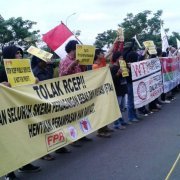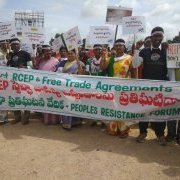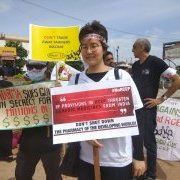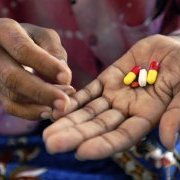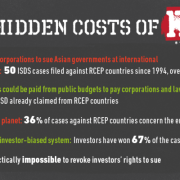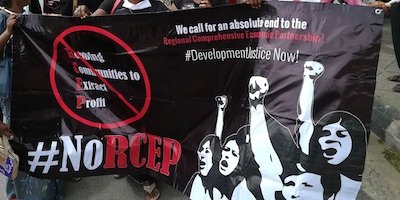
The Regional Comprehensive Economic Partnership (RCEP) is a “mega-regional” trade agreement that was signed in November 2020. It had been negotiated since 2012 between the 10 ASEAN (Association of South-East Asian Nations) governments and their six FTA partners: Australia, China, India, Japan, New Zealand and South Korea. But in November 2019, India decided not to join the treaty. The eight years of RCEP negotiations were shrouded in secrecy. Social movements could only rely on leaks to analyse the proposed agreement.
RCEP is largely driven by ASEAN. Indeed, the project originated in, and expands upon, the stitching together of five existing ASEAN+1 trade agreements that ASEAN signed with Japan, South Korea, China, India, Australia and New Zealand. The stated goal of the negotiations was to “boost economic growth and equitable economic development, advance economic cooperation and broaden and deepen integration in the region through the RCEP,” according to the ASEAN website. RCEP covers almost every aspect of economy such as goods, services, investment, economic and technical cooperation, intellectual property rights (IPR), rules of origin, competition and dispute settlement.
Throughout the negotiations, concerns about the RCEP were voiced in a number of contexts and concern a range of issues. A 2015 leaked text on intellectual property rights proposed by Japan’s negotiators confirmed concerns that the deal could go beyond the World Trade Organisation’s Agreement on Trade Related Aspects of Intellectual Property Rights (TRIPS).
Various movements and organisations, including environmental groups, trade unions, domestic workers, farmers, hawkers, women groups, and people living with HIV have raised their concerns throughout the negotiations and the current ratification process. Thousands of people marched against the trade deal’s harmful provisions, demanding transparency from governments, in Hyderabad, India, in July 2017, and organised a People’s Convention on RCEP.
In 2019, public pressure forced India to pull out of the negotiations. Several harmful provisions were dropped too, such as the investor-state dispute settlement (ISDS) mechanism, which allows corporations to sue states before arbitration courts over lost expected profits, and mandatory UPOV91 membership. UPOV is a specialised system of seed patenting, which makes it illegal – in fact, a criminal offence — for farmers to save and reuse protected seeds.
The final text shows that there are no increases in patent monopolies for medicines above the WTO standard of 20 years, advocated by pharmaceutical companies and pushed by Japan and South Korea early in the negotiations, which could have delayed the availability of generic forms of medicines, especially in low income countries, and would have been very damaging in the context of the COVID-19 pandemic. The electronic commerce chapter left out some of the most dire rules pushed by Big Tech, and present in other trade deals such as the Trans-Pacific Partnership, and is not enforceable.
However the RCEP will worsen the balance of trade of almost all of its member countries, especially ‘developing’ and ‘less developed’ countries, according to a UNCTAD assessment. This can potentially increase the pressure to privatise essential public services, all the more so since such services are, under the deal, governed by international “trade rules” that suit corporations and limit states’ ability to regulate them in the public interest. The same rules that remove barriers to foreign investment can also apply to the agriculture sector, and increase the trend of land grabbing.
A joint statement by seven trade union federations in the Asia-Pacific said that the RCEP would result in the deterioration of working conditions in a race to the bottom under heightened competition, in which migrant workers face the worst consequences. They added that: “instead of furthering a free trade project, countries should be collaborating on reviving their economies and expanding public goods.”
China, Singapore and Thailand were the first countries to ratify the agreement at the beginning of 2021. In order to enter into force, RCEP needs to be ratified by six ASEAN countries and three non-ASEAN countries.
See the full text here
Last update: April 2021 / Photo: bilaterals.org







